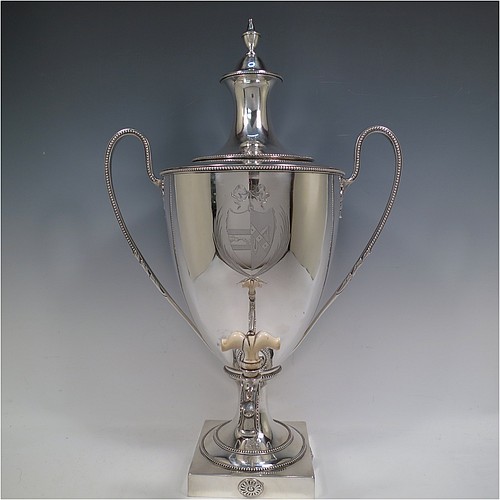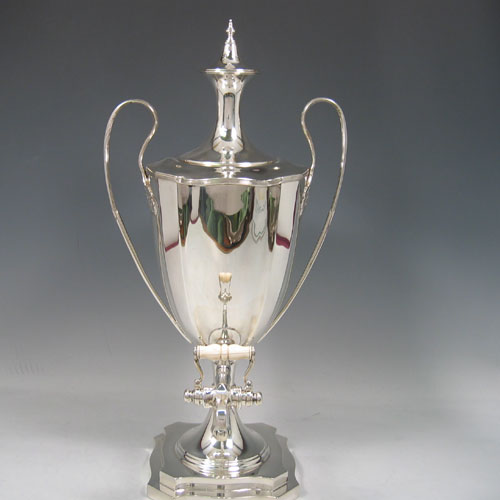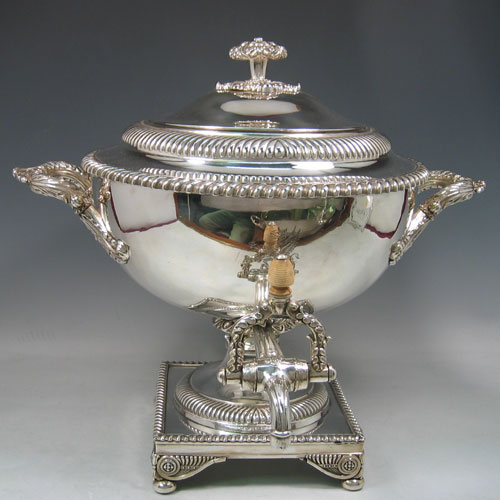ANTIQUE SILVER SAMOVARS
Simply click on any antique silver samovar or tea urn picture to see an enlarged image. If you are interested in purchasing one of our beautiful sterling silver samovars or tea urns, we offer secure online payment as well as free insured delivery on all antique samovars purchased or visit our silver store in the heart of the London Silver Vaults. You may also be interested in Antique Silver Kettles.
| Grid View | Learn more here |
Click on photos to enlarge

|
#d4140 - |
Antique Georgian sterling silver urn-style samovar with lift-off lid and spigot. Made by Charles Adams of London in 1790. Please note that there is no mechanism for heating, and the body is crested above the spigot. The dimensions of this sterling silver samovar are height 40 cms (15.75 inches), width 24 cms (9.5 inches). Weight approx. 48 troy ounces. |
£4,775 |
|

|
#j6860 - |
A very handsome Antique Georgian Neoclassical style Sterling Silver samovar, having a plain urn-shaped body, with pull-off lid and finial, two side-handles, an original spigot with bone handle, all with applied bead-edged borders, and all sitting on a pedestal foot with a square base. Please note that this piece has an unusual heating mechanism where the main body detaches from the foot allowing for the insertion of a heated piece of pig-iron. Made by John Denziloe of London in 1783. The dimensions of this fine hand-made antique silver samovar are height 52 cms (20.5 inches), width 33 cms (13 inches), and it weighs approx. 3,112g (100 troy ounces). Please note that this item is crested. |
£8,575 |
|

|
#b0164 -
|
Antique Georgian Old Sheffield plated urn-style samovar having a plain rectangular body with rounded corners and tapering sides, a lift-off lid with finial, with original liner for heating, two side handles, a spigot with ivory handles, with applied gadroon-edge borders, and all sitting on a pedestal foot with four ball feet. Made in ca. 1810. The dimensions of this fine hand-made Old Sheffield plated silver samovar are height 33 cms (13 inches), width 28 cms (11 inches), and depth incl. spigot 23 cms (9 inches). |
£985 |
SOLD |

|
#d1193 -
|
Antique Edwardian sterling silver samovar, made by William Aitken of Birmingham in 1908. Height 41 cms. |
£1,695 |
SOLD |

|
#e9050 -
|
Antique Georgian Old Sheffield plated samovar made in ca. 1815. (n.b. internal heater holder missing). Height 37 cms. |
£2,175 |
SOLD |

|
#e1730 -
|
Antique Georgian sterling silver samovar, having a plain ovoid body, with pull-off lid and finial, two side-handles, a spigot with bone handle, with gadroon-edge borders, and all sitting on a pedestal foor with a pierced gallery square base and four claw and ball feet. Please note that this piece has a very unusual heating mechanism where the main body detaches from the foot allowing for the insertion of a heated piece of pig-iron. Made by Ebenezer Coker of London in 1772. The dimensions of this fine hand-made silver samovar are height 46 cms (18 inches), width 24 cms (9.5 inches), and it weighs approx. 1,874g (60.5 troy ounces). |
£6,275 |
SOLD |
Learn more about antique silver SAMOVARS here.
Antique Silver SAMOVARS description:
A type of serving vessel for keeping either water, tea, or coffee hot. Used for replenishing tea pots and coffee pots. The word Samovar came into vogue, in England, during the reign of King George V. The last Czar, Nicholas II and King George V were 1st cousins; their mothers, Queen Alexandra of Britain and Empress Maria Feodorovna of Russia were sisters. Before that time they were simply called Tea Urns.
Antique Silver SAMOVARS history:
The earliest samovars were made about the same time as the first tea pots in the early 1700s. But British samovars with hallmarks before 1750 are now very rare. Most were made in the latter part of the 18th century and throughout the 19th and early part of the 20th century. There are very few orders for new samovars today mainly because the old ones are still being used and work well.
Antique Silver SAMOVARS design:
Their design and style are really controlled by the heating mechanism employed. There were basically two methods used. The earlier method utilised a pre-heated piece of iron that was lowered into a cylindrical socket affixed vertically inside the urn. The second later method used from about 1790 involved a spirit lamp with a burner that was normally held in a frame below the urn. This latter method allowed the heat to be controlled much more easily.
Antique Silver SAMOVARS collectors note:
Many of the earlier pre-1790 samovars and urns do not have their original heating mechanisms which either corroded or were lost. The later tea and coffee urns with burners must have original mechanisms with correpondin hallmarks. Always look inside the urn to make sure that there are no major repairs around the spigot. Be especially wary of repairs that have been carried out using lead.













